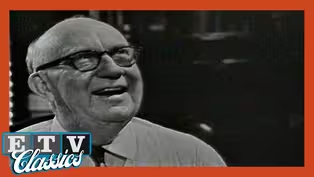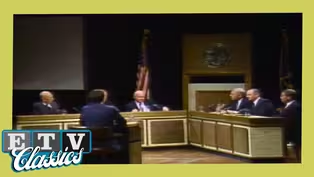ETV Classics
Solomon Blatt: Speaker Emeritus of the SC House | Carolina Journal (1985)
Season 15 Episode 13 | 27m 49sVideo has Closed Captions
The life and career of Solomon Blatt, Speaker Emeritus of the S.C. House of Representatives.
This episode of Carolina Journal looks at the life and career of Solomon Blatt, Speaker Emeritus of the South Carolina House of Representatives. For almost 50 years of his life, Sol Blatt served the people of South Carolina through his work in the General Assembly.
Problems playing video? | Closed Captioning Feedback
Problems playing video? | Closed Captioning Feedback
ETV Classics is a local public television program presented by SCETV
Support for this program is provided by The ETV Endowment of South Carolina.
ETV Classics
Solomon Blatt: Speaker Emeritus of the SC House | Carolina Journal (1985)
Season 15 Episode 13 | 27m 49sVideo has Closed Captions
This episode of Carolina Journal looks at the life and career of Solomon Blatt, Speaker Emeritus of the South Carolina House of Representatives. For almost 50 years of his life, Sol Blatt served the people of South Carolina through his work in the General Assembly.
Problems playing video? | Closed Captioning Feedback
How to Watch ETV Classics
ETV Classics is available to stream on pbs.org and the free PBS App, available on iPhone, Apple TV, Android TV, Android smartphones, Amazon Fire TV, Amazon Fire Tablet, Roku, Samsung Smart TV, and Vizio.
Providing Support for PBS.org
Learn Moreabout PBS online sponsorshipMore from This Collection
Find classic news and public affairs programming from South Carolina ETV.
Open Line: Carolina to Shanxi (1980)
Video has Closed Captions
An exchange program for higher education between USC and the people of China's Shanxi Province. (28m 51s)
Charleston Place | Carolina Journal (1986)
Video has Closed Captions
This edition of "Carolina Journal" revisits the opening of the Charleston Place complex. (27m 20s)
U.S.S. South Carolina | Carolina Journal (1984)
Video has Closed Captions
Michael Collins goes aboard the missile cruiser U.S.S. South Carolina as it visits its namesake. (28m 54s)
Strom Thurmond Remembered (2003)
Video has Closed Captions
Charles Bierbauer reviews the life and accomplishments of South Carolina Senator Strom Thurmond. (1h 51m 22s)
Strom Thurmond At The Seat of Power (1982)
Video has Closed Captions
The documentary follows the life and career of Strom Thurmond. (29m 49s)
Profile: The Senator from Barnwell: Edgar A. Brown (1967)
Video has Closed Captions
A visit with the venerable Edgar A. Brown in his law office, home, and the streets of his hometown. (14m 42s)
A Conversation with Justice Ernest Finney, Jr.: A Lifetime of Success (2000)
Video has Closed Captions
The honorable Judge Ernest A. Finney, Jr. discusses his life, career, and legacy in SC's lawfare. (27m 47s)
Profile: Senator John Drummond of Ninety-Six | The Big Picture (2008)
Video has Closed Captions
The life and times of Senator John Drummond of Greenwood, South Carolina. (26m 53s)
Video has Closed Captions
The memoirs of three businessmen who attribute their successes to their time in the US Marine Corps. (28m 54s)
The Governors' Roundtable | Carolina Journal (1989)
Video has Closed Captions
A round-table discussion with nine men who served as governor of the state of South Carolina. (57m 54s)
Elie Wiesel | Solomon Tenenbaum Lectureship in Jewish Studies (2006)
Video has Closed Captions
Professor Elie Wiesel, first Nobel laureate delivers a lecture as a part of the Tenenbaum series. (1h 17m 18s)
Remembering Bill Moyers: War in the Gulf - Town Meeting (1991)
Video has Closed Captions
Bill Moyers, who died June 26, 2025, was an award-winning journalist and PBS host. (59m 32s)
Providing Support for PBS.org
Learn Moreabout PBS online sponsorshipA production of the South Carolina Educational Television Network.
♪ ♪ Mike Collins> Tonight on Carolina Journal we'll look at the life and career of Solomon Blatt.
Speaker Emeritus of the South Carolina House of Representatives.
A man who has spent more than 50 years of his life serving the people of South Carolina through his work in the General Assembly.
Sol Blatt was born in 1895, in Blackville, South Carolina.
He was the second son of Nathan and Molly Blatt.
His parents had immigrated to this country from Russia.
Speaking no English, when they arrived, they worked hard and managed to put their two sons and a daughter through college.
Sol Blatt was greatly influenced by his parents, so much so, that his respect for them is strong even today.
> They were wonderful people, and they had a fine influence on me because my father was a law-abiding citizen and my mother loved everybody.
And they did everything that they could to encourage us to do what was right and to, provide an education for us, give us the opportunity of obtaining one.
And so, my brother went to the Citadel and I went to the University, and I had a sister who went to, Columbia College.
And, they watched over me very carefully and, wouldn't let me do anything that, they could prevent me from doing that was wrong.
And, tried their best to teach me the right things to do.
And if I accomplished anything in my early life, the first years that, I was big enough to go to the University, know anything at all, it was because of the love that, my mother and father, showed their children.
And, trying to convince us that, it was easy to do what was, right.
If we wanted to do what was right.
Mike> In 1917, Sol Blatt graduated from the University of South Carolina with a degree in law.
The opportunities and education afforded him by the university are something he's never forgotten.
Rep. Blatt> It seemed to me to be an atmosphere on the campus.
Come on, you're a son of South Carolina, or you may come from Virginia or anywhere else, but if you want to obtain an education, we got it here.
We got what it takes to give it to you, and we'll help you.
And I had that feeling that my social standing and being of the Jewish faith didn't have anything in the world to do with the University's effort to want to help me.
And that it went out of the way to do it.
And I felt that that was, contribution that they made towards, giving me the opportunity to walk in the long and treacherous road of life.
And to help prepare me to compete with those who walk along with me so I might do whatever I was supposed to do to be partly successful anyhow.
And that's a debt that I've never been able to repay.
Or to pay.
I have, I've done everything I could to help the University.
I've got them many dollars.
Got it some buildings that wouldn't have gotten without my help.
But I owed it.
And I want to show them that I loved it and that I, appreciated, more than I could ever say what they did for me.
I'm still indebted to them, If I have a chance, I'll help them tonight.
Mike> Sol Blatt's first attempt at an elected office was not successful.
Though he lost a bid for the South Carolina House in 1930, Blatt learned a valuable lesson.
Rep. Blatt> It taught me that a lot of people who were politically involved, that you couldn't depend upon them always.
And the ones that got me into the campaign, what they wanted to do was to cut me off in my early days in the practice of law and being... inclined to want to become involved politically.
The first thing they thought of doing was to get me... encourage me to run and then cut my throat because they thought that would be the end of me.
And frankly, after I was defeated, I thought it was end of me politically.
Mike> That unsuccessful campaign taught the Barnwell County lawyer how to handle himself politically when social and racial prejudice were prevalent in South Carolina.
Rep. Blatt> Well, of course, because, I was of the Jewish faith, there was a lot of opposition to me on account of my religion.
But, you know, that's one thing I never did let worry me.
I loved my mother and daddy, and they were of the Jewish faith, and I was proud of them.
And I was proud to be of the faith that they belonged to.
And so I would take it in my stride.
And, I wasn't critical of anybody, back along those days, the Klan was very active too, you know, and they cut my throat, from the very beginning.
And, and so I never said anything.
When people would ask me about it.
I knew that they were coming purposely to get me to say something against the Klan, which I refused to do.
I told them a man had as much right to join the Klan, as he did the Masonic Lodge if you wanted to.
And that was his business, and it wasn't mine.
And that I just took it into stride and, kept my mouth shut.
And, I learned a lesson at that time, about keeping your mouth shut when you when you should keep it shut.
And, I treated them with every courtesy and consideration.
And finally they got, began to get a little friendlier with me as the years went by.
And then they on the occasions that I did run again, those that, were responsible for defeating me were the ones that encouraged me to run and told me if I did run, I wouldn't have any opposition.
I didn't believe them because they had lied to me before.
And, but I did believe them this time.
And, I ran.
I didn't have any opposition.
That's when I was elected in 1932.
Mike> The voters in that Barnwell County District returned Blatt to the House for a second term in 1934.
He was also elected to the position of speaker pro-tem.
Prior to starting his third stint in the legislature in 1936, Blatt ran a hotly contested race for Speaker of the House.
A campaign he was not supposed to win.
Rep. Blatt> But I worked pretty hard.
I rode about, I'd say 15 or 16,000 miles over the state in that race.
And, I went, I left home every morning, I came home every night but one.
And that was a lot of riding.
But I worked harder than any fellow you ever saw at this job?
And if you remember that, Governor Olin Johnson was going to try to beat me for speaker.
And named man to run.
He got his group together and they named a man named Caston Wannamaker, a very fine fellow who was at the University with me.
He and I served in the same division, during World War I.
And, I made it, I was determined that I was going to win if work would, help me win it.
And I went to every county in the state, talked to every representative, and asked him to write me a letter if he was going to support me.
They wrote me that letter.
And I remember on one occasion when Bruce Littlejohn was the delegation, he's now Chief Justice of the Supreme Court.
We had a luncheon over there, I did for him, and, Claude Taylor was in the House and, I forgot some of the rest of them.
But, they, had had a visit from Wannamaker... Who told them he was way out in front, he was going to win and whatnot.
And I took these letters that I had, over there.
And at the luncheon, they called on me to say what I wanted to say, and I did.
And I said, "Now, I want to be perfectly honest with you.
I haven't enough votes to be elected, neither does Mr. Wannamaker.
But I'm sure he gave you the names of some people that were supporting him that I tell you, they're not going to support him.
And if you tell me the names of some of them that, said they were going to support him as he told you.
Then I'd like to have the opportunity to show you something in reply to it."
They gave me the names of about six or eight or more members of the House who pledged to him when, as a matter of fact, I had their letters in my file pledged to me.
And I pulled them out and read it to them and passed it around so they could see it.
And then when I left there, I got the unanimous endorsement of a Spartanburg delegation.
And that led to the downfall of Mr. Wannamaker.
Mike> Representative Blatt became Speaker Blatt, by a five vote margin, as he had predicted.
He served as the presiding officer of the House until 1947, when Strom Thurmond was elected Governor.
The Barnwell County lawmaker was reelected to the House, but stepped down from the speaker's podium.
Rep. Blatt> I had, not been well.
And my doctors felt like that if I ran the race, as I did when I was first elected, physically, I was not capable of doing that.
And then Governor Thurmond was strong as he could be.
And, be perfectly fair with you, I thought I'd have some difficulty being elected, and I didn't want to get defeated, in a statewide effort or locally.
So I decided it was in the best interest of myself and probably the best interest of the state that I not run.
And I didn't run because I did want to continue to serve the state.
And I thought there'd be that, break in there, difficulty, proper operation of the House and the government, with the cooperation of the Governor and that the House probably wouldn't cooperate with him.
And it could be traced to me.
And that was the last thing I wanted done.
I wanted South Carolina to make progress, and I wanted peace and harmony prevailing.
Mike> Blatt was reelected Speaker in 1951, a position he held until 1973.
In June of 1973, he was elected Speaker Emeritus.
History books have always included Sol Blatt as a member of a group called the "Barnwell Ring."
Some political observers say there has never been a combination more powerful than Sol Blatt and Senator Edgar Brown.
That is, if you believe the Barnwell Ring existed.
Rep. Blatt> There never has been any such thing as the Barnwell Ring.
It just so happened at that time, Mr. Harley became, he was Lieutenant Governor, he became Governor upon the death of the, I mean, upon the promotion of the Governor to the United States Senate.
And... they, we had, I was Speaker.
Edgar Brown was Chairman of the Finance Committee.
And Winchester Smith, who was from Barnwell in the House, was Chairman of Ways and Means Committee.
And we happened to be in power and in control.
And, I think South Carolina made as much progress during that period of time it ever made, at any period of time.
But, they were not, Edgar Brown has never been my political friend, never voted for me and never supported me.
And there's been no such thing as the Barnwell Ring.
Now, I got along with him alright.
And, but so far as, actively supporting me at home, he never did.
Mike> During his more than 50 years in the South Carolina House, there was only one occasion when Speaker Blatt considered another position outside of that body.
Rep. Blatt> One time I... had a feeling I'd like to be a judge.
And, there was a vacancy on the Supreme Court three times during that period of time, years ago, that I could could've been elected without opposition.
I wouldn't, I wouldn't run.
I remember John Cauthen, when... there was a vacancy on the Supreme Court and a group of my friends were trying to get me to take it.
I don't know whether they wanted to get rid of me out of the House or they really thought I had the ability to serve, or not.
But, whatever the reason might be, they, really did put the pressure on me to take the Supreme Court Justice job.
But that's something I never did want to be.
But they got me a little bit interested in it.
I don't know why I was foolish enough to think about it, but they got me a little interested.
And John Cauthen, called me and came to see me and begged me not to quit as Speaker to stay on there because he felt that I'd been some service to the state.
And, it, because of John's efforts, which resulted in my receiving hundreds of telegrams begging me not to run, that I didn't run.
Mike> And there was a time when a group of business leaders decided that Sol Blatt was the right man for a job outside of the legislature.
It began with a visit to Blatt's Barnwell law office.
Rep. Blatt> And, they called me and told me, about four or five of them, I think it was, maybe six, wanted to come to Barnwell to see me.
I had no idea what they wanted to see me about.
But they did come, and, we sat in the office and talked a while.
And then they said, "Sol, we came down here to get you to run for Governor."
Well, it, I had no idea in the world in why they ever thought about that, and, I had never thought about it.
But, I just told them, "No, not me."
Wanted to know why.
I said, "Well, the biggest reason I'd give you is cause I can't be elected or I could be elected governor."
They said, "Well, you run, we'll put up every nickel that's needed, and all you have to do is run."
I thanked them very much for paying me that compliment.
They thought that I had the ability and character, dedication to serve the state as Governor.
But, I wouldn't run.
Anyhow, I had arranged for them to have lunch with me, and we came here to the house, and, we were eating lunch, and, they asked my wife says, you know, what we really doing down here?
And, she said, "No."
Said, "We came to get Sol to run for Governor."
And I said, "Honey, don't worry about that, because I'm not going to make that mistake."
Anyhow, I didn't run, but they did bear down on me pretty hard.
Mike> Sol Blatt's years as Speaker have been characterized as leadership through strength.
Representative Ramon Schwartz, one of Blatt's successors, remembers well from a personal viewpoint.
> Mr. Blatt used to preside most of the time himself, when I first came to the House.
He did not call on his Speaker pro tempore as often as others do now.
And, I happened to be, Chairman of the Election Law Subcommittee about my second or third year in the House from the Judiciary Committee.
And I was supposed to be floor leading a bill that would have changed the date of the primaries.
And I... noticed that I felt that I was doing a pretty good job of making my point.
And all of a sudden I noticed in the chair was not Mr. Blatt, but another member presiding.
And I couldn't imagine what was happening.
Well, when we took a vote, I lost that vote by a substantial amount when I thought I had it won.
And I, I learned later that Mr. Blatt thought I was making some points.
He opposed the legislation and he was walking up and down the aisle simply saying, "It's always been my policy not to change any law that I've been elected under."
And so he immediately changed the votes on the floor of the House that day.
And we've had a lot of good laughs about that.
Mike> Sol Blatt is no longer the presiding officer of the House.
In addition, his health prevents him from spending as much time in Columbia as he'd like.
However, many members of the House look to him for guidance.
> One nice thing about bouncing your ideas off of him, he's totally honest with you.
If he doesn't think it's a good idea, he can tell you in about three words and, sometimes he doesn't bother to dress those words up, but, he's a good sounding board.
He knows what the public will respond to.
And, I think the big thing is he's so honest with you about it.
If he doesn't think it's a good thing, or if he doesn't think it'll work, he'll tell you.
I recall two years ago that, he invited me to a luncheon that he sponsored for the freshmen of that particular class, and they sat there in awe of him, they have heard of him.
Some of them, older men, not necessarily younger people, but people who had never had the opportunity to be in his presence.
And, of course, he always entertains you with stories and things.
And then he always admonishes people, particularly young people and then freshman groups, when he speaks with them.
To tell them to stay on the straight and narrow and do their work.
But I think they're all impressed with him.
And they love to have him there.
Mike> For the past seven years, Blatt's seatmate has been Pickens County Representative Larry Martin.
When they first sat together, not only was Martin a freshman, but he was only 21 years old.
> Yeah, I got the biggest charge of, my life when I first came into that chamber and sat down with him and it dawned on me who I was sitting with, you know.
It was an awesome experience, and, it has been an awesome experience sitting with him because I recognize, the tremendous importance he has been to this state.
He's a very genteel person.
He's not a hard person, but yet he's a very firm person in his approach to dealing with issues.
And I really admire that.
And I've tried to adapt to that because, you know, when you deal firmly with issues, there's no question as where you stand.
There's no question where Sol Blatt stands on issues.
And, I admire that.
And I tried to take, example from that.
Mike> Being seated next to Sol Blatt can make life very interesting, particularly when you find yourself voting on the opposite side of an issue he supports.
Rep. Martin> He always talked about the sinner going astray.
And, I was the sinner, of course.
And, one time I asked him, "Well, did it ever occur to you you might be going the wrong way?"
He said, "No, sir."
(laughter) So, you know, I, I realized that, you know, I had a constituency to represent.
I'll never forget the Public Service Commission Bill of course, in '79, when I first came to the House, was a very... long and drawn out to bay.
And he felt very strongly opposed to that bill.
And he... couldn't understand why I was voting the way I was.
And I sat down and briefly tried to explain to him one day, and for a couple days there, he just didn't have a whole lot to say.
Course he got over it and we were always have been the best of friends.
And we differed, and he appreciate, appreciated the difference that I had with him for the reasons I did.
And he understood that.
But at the same time, he, he would give you a hard time and, would try to sway you.
And I appreciated that.
And he appreciated, I think, even more, the position I had and the, the determination I had to stay with the, position I took on that particular issue.
Mike> In 1984, the legislature focused much of its attention on raising the state sales tax from four to five percent in order to fund the Education Improvement Act.
In the 1950s, there was no sales tax at all, but Sol Blatt and Governor Jimmy Byrnes saw the need for more state money.
Rep. Blatt> I remember the State Hospital at that time, people were sleeping on concrete floors.
And they had, the beds that they had in there they were just stacked together.
Nobody could get out of there, if a fire happened.
Jim Burns was Governor, and he was the only man in South Carolina could have, had us put on the sales tax.
He took us out to the State Hospital and showed us the condition of things out there.
And we came away from there determined we were going to provide more money for them.
And while the tax itself, was to go to education, it left some money in the state treasury that we've been putting in the field of education, that we didn't need to do it because of the sales tax.
Therefore that money, could be used for the purposes of helping, other institutions and, part of it would be used to improve conditions at the State Hospital.
The State Hospital has never been given enough money to properly take care of those people out there, but that's the way the first sales tax went on.
Then when Bob McNair, I think it was, was Governor, the other one cent went on.
Mike> A man whose career spans more than 50 years might have some difficulty in highlighting his personal accomplishments.
However, Sol Blatt never lost sight of his goal of improving life in his home state.
Rep. Blatt> I think I've had a hand in everything of any importance that happened in the state.
I didn't win every battle I fought.
And I lost a lot of them.
But we also won, many battles.
And, I think it was, my being, what I considered to be a conservative.
I believe that a man ought to... eat what he's worked for, and, wear the clothes he's paid for.
And I think that, what we had to do with him is give him an opportunity so he can buy that food, and those clothes and the only way he's going to have that opportunity is to give him, fix a state, to put the state in such shape as they can provide employment for him at reasonable compensation.
And I don't believe in starving anybody to death.
I don't believe that anybody has got any right to expect anything from the state, when they don't work to get it.
But, that has been my attitude all along, and it still is.
And, I worked hard to try to... work, to provide protection, for those who invested their dollars.
Because a man is not going invest his dollars in South Carolina unless he's going to make a fair return on his investment.
And he can't make a fair return on his investment, so that he can give employment to those who need employment unless representatives in the House and in the Senate and the Governor will work for that fellow to help him, get that fair return on his investment.
And so that's always been in the back of my mind.
Well, I've got to help this company because if I don't help them, they're not going to be able to run and give employment to people who need employment.
Mike> And it's this way of thinking that has convinced the people of Barnwell County that Solomon Blatt is the best person to represent them in the State Legislature.
Rep. Blatt> I hope it's because, I have been helpful to the people.
And I hope that, it's because, of my efforts to be helpful that the people have been helped and, I hope in my own heart that it's because I've never told them a lie.
And that they could come to me and they can see me... the poorest person in Barnwell County or around this area anywhere, want to see me they can see me.
And I'll try to do what I can to help them, but I won't tell them a lie.
I'm not going to tell them I'm going to vote for them for some office if I'm not going to do it.
I'm not going to tell them that.
But I think it's because that I have made the effort to do what's right and to tell them the truth and to serve them to the best of my ability, that's caused them to have a little confidence in me that I appreciate very much.
Rep. Schwartz> I think that each member of the House, feel the privilege of serving with Mr. Blatt means that they are touching history.
We hear the statement, it's very trite, a man being a legend in his own time, but this is true with Mr. Blatt.
He has served as Speaker of a deliberative body and a democratic process, longer than any other person on the face of this earth.
He's, I don't remember the exact number of years, but some 34 years, I believe he served this House as its speaker and served it ably with distinction and honor.
Rep. McLellan> He was a legend to me when I first came here.
And, one of the honors that I think that I... as I look back on my service, will be the friendship that I have with Mr. Blatt.
I just think he's an outstanding individual.
And, he's part of the history of this state.
And I really enjoy when particularly when he was coming up here, we roomed next to each other, sitting in the evening and talking to him about some of his experiences, long experiences in state government.
Things that I had heard about and maybe even had read about in history books.
You could sit and talk to him and hear firsthand information and sometimes behind the scene facts about how things did develop.
As you know, he's an unusual person.
Even though his body is 90 years old, his mind appears to be much younger.
And, he hadn't forgotten anything.
Truly an amazing person.
One of the things that I really appreciate about Mr. Blatt... You don't talk to him long in a personal conversation before you, he speaks of his appreciation for his parents.
And he feels he owes them a great debt.
And then in to that conversation, he goes into, his appreciation for the state of South Carolina, for the way they received his parents.
They were both immigrants and he gives credit to the state for the reception they gave his parents and consequently, what it has meant to him.
And that's sort of unusual, for people to retain that type of appreciation, for their success.
And he again, you don't talk to them long before he speaks of that.
That impresses me with Mr. Blatt.
Rep. Martin> He's a solid statesman in every way, in the truest sense of the word.
And, you know, that's, that's saying a lot.
You can't say that about many people.
Most people you say that about after they're gone.
And with him still being with us and everybody pretty much acknowledging that, I think that, is a tribute to him and his long service to South Carolina.
♪ ♪ ♪ ♪
Support for PBS provided by:
ETV Classics is a local public television program presented by SCETV
Support for this program is provided by The ETV Endowment of South Carolina.

























